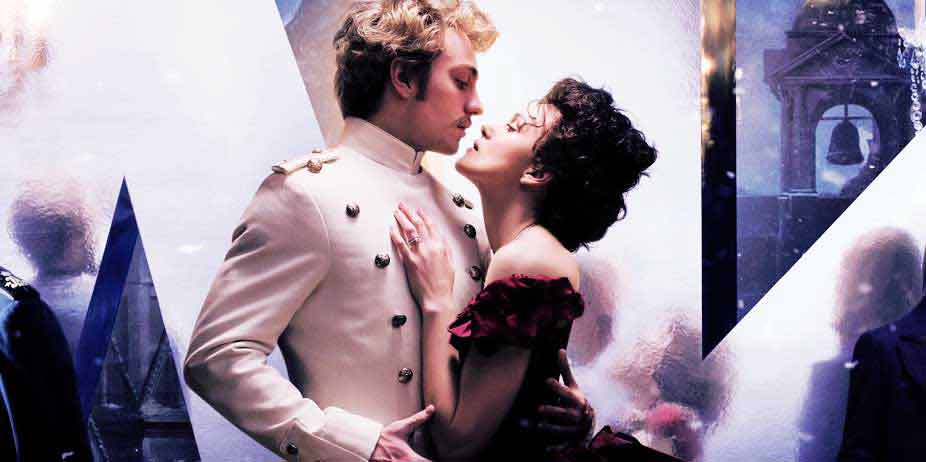Anna Karenina (2012)
Since discovering it a few years ago, Anna Karenina has become one of my favorite tragedies. This adaptation is an unusual approach to a Russian classic, a risk that for the most part pays off, but sadly revolves around a script that utterly misses the point of the original.
When his marriage threatens to crumble into dust after extra-marital affairs, Stevia (Matthew Macfayden) calls upon the assistance of his beautiful sister Anna (Keira Knightley) in amending matters with his wife. Leaving behind her politically-minded husband, Karenin (Jude Law), Anna takes a fateful train ride that alters her life forever. In society, she soon meets and infatuates the passionate, youthful Count Vronsky (Aaron Taylor-Johnson), whose pursuit of her threatens not only her marriage but her eventual happiness. In the meantime, her brother's dear friend Levin (Domhnall Gleeson) arrives to propose to Kitty (Alicia Vikander) only to find his efforts thwarted.
Tolstoy's novel is a multi-faceted work of tragedy and comparisons between lust and love, but more than that, it is about how forgiveness and faith transform lives. In many ways, this adaptation is a visual masterpiece and brilliant artistic achievement. It gambles mightily in its metaphors by limiting most of the indoor scenes into an old theater, thus reminding us that all men (and women) are simply "players on a stage." When I first heard of this approach I thought it would be a disaster and severely limit the scope; instead, it is an intriguing twist that constantly surprises and engages its audience. The costuming is scrumptious and the acting is phenomenal, particularly from its leading lady. Unexpectedly, aspects of it are also fraught with humor, which brings much-needed levity into the seriousness of the subject matter. The score is sometimes demure and at other times perfectly suits the mood.
Where its faults lie are in its utter absence of the religious themes of the book. Though we do get to see the forgiveness of Karenin (and indeed, his are some of the best scenes) and how her own self-doubt and hatred eat away at Anna, the roles of Levin and Kitty are so reduced that it leaves us wondering why they are involved in the first place. The book's purpose is to show us wild, passionate, sexual desire in an extra-marital love affair, that turns itself inside out and descends into jealousy and contempt, contrasting it with a pure and innocent love that begins with an act of total forgiveness. But... that isn't in this version, and as a result, Levin's change from an atheist to a man aware of the existence and goodness of God is also absent. What we are left with is an incomplete story that does hit some of the highlights of the moral messages of the book but not the most important ones.
Much of the adaptation is masterful but I did miss some of the more impacting moments in the story -- like the contrast between the birth of Anna's child and Kitty's. However empty as it may be, it does invoke in a viewer -- and particularly a Christian viewer -- a sense of deep compassion toward this broken, sinful woman in desperate need of loving kindness. Our desire is to see her changed for the better, saved from her descent into despair, yet there is nothing we can do and in the end, that is what makes this story so impacting. I've seen many versions of this story and Keira's depiction of Anna is one of the best. It helps that she is surrounded by such talent, most of them fairly well-known among the BBC crowd. It isn't a perfect adaptation, but it's well worth a watch.
Sexual Content:
A sensual love scene in which much heavy breathing and kissing is present, but no nudity; a later scene that may imply further intimacy (more heavy breathing; we see nothing but their faces); Anna hallucinates a reflection of two people making love in a train window (some movement); references to extra-marital affairs. We see go-go dancers (fully clothed) on a stage. A man and a woman are shown asleep on a bed; his bare side is fully visible.
Language:
One profanity.
Violence:
A mangled, bloody corpse is seen after a man is run over by a train; a woman throws herself in front of a train and we see her body (no blood). A horse suffers a fall and is shot (off-screen), as its back is broken. A man shoves a pregnant woman to the floor.
Other:
A woman says she would have run off with a lover, had anyone tempted her.

